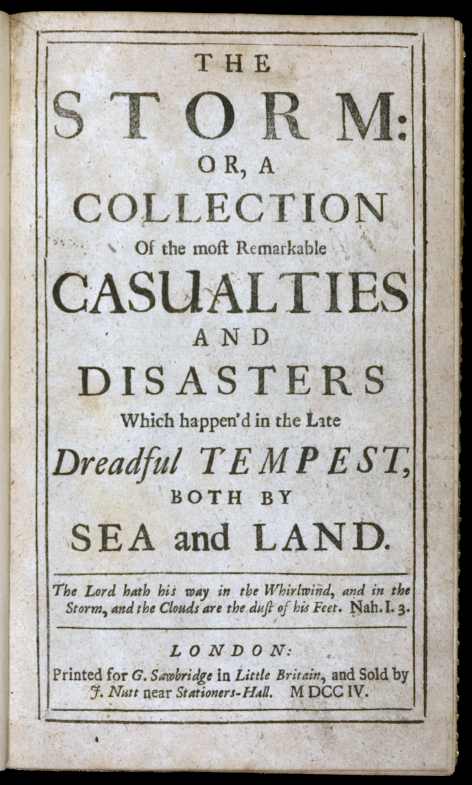The Storm (Daniel Defoe) on:
[Wikipedia]
[Google]
[Amazon]
 ''The Storm'' (1704) is a work of journalism and science reporting by British author Daniel Defoe.John J. Miller
''The Storm'' (1704) is a work of journalism and science reporting by British author Daniel Defoe.John J. Miller
"Writing Up a Storm"
''The Wall Street Journal''. 13 August 2011. It has been called the first substantial work of modern journalism, the first detailed account of a hurricane in Britain. It relates the events of a week-long storm that hit London starting on 24 November and reaching its height on the night of 26/27 November 1703 (7/8 December 1703 in the
''The Storm''
i
''The Novels and miscellaneous works of Daniel Defoe, Volume 6''
Henry G. Bohn, 1855 (scanned book) * {{DEFAULTSORT:Storm 1704 books 18th-century meteorology Works about natural disasters Works by Daniel Defoe
 ''The Storm'' (1704) is a work of journalism and science reporting by British author Daniel Defoe.John J. Miller
''The Storm'' (1704) is a work of journalism and science reporting by British author Daniel Defoe.John J. Miller"Writing Up a Storm"
''The Wall Street Journal''. 13 August 2011. It has been called the first substantial work of modern journalism, the first detailed account of a hurricane in Britain. It relates the events of a week-long storm that hit London starting on 24 November and reaching its height on the night of 26/27 November 1703 (7/8 December 1703 in the
Gregorian Calendar
The Gregorian calendar is the calendar used in most parts of the world. It was introduced in October 1582 by Pope Gregory XIII as a modification of, and replacement for, the Julian calendar. The principal change was to space leap years dif ...
. Known as the Great Storm of 1703
The great storm of 1703 was a destructive extratropical cyclone that struck central and southern England on 26 November 1703. High winds caused 2,000 chimney stacks to collapse in London and damaged the New Forest, which lost 4,000 oaks. Ships wer ...
, and described by Defoe as "The Greatest, the Longest in Duration, the widest in Extent, of all the Tempests and Storms that History gives any Account of since the Beginning of Time." The book was published by John Nutt
John Nutt (before 1600 – after 1632) was an English pirate. He was one of the more notorious brigands of his time, raiding the coast of southern Canada and western England for over three years before his capture by Sir John Eliot in 1623. Hi ...
in mid-1704. It was not a best seller, and a planned sequel never materialised.
Within a week of the storm Defoe placed newspaper ads asking readers to submit personal accounts, of which about sixty were selected and edited by Defoe for the book. This was an innovative method for the time before journalism that relied on first-hand reports was commonplace. Defoe considered the accounts reliable because "most of our Relators have not only given us their Names, and sign'd the Accounts they have sent, but have also given us Leave to hand their Names down to Posterity." ''The Storm'' has thus been called the first substantial work of modern journalism.
Defoe described the storm as "the tempest that destroyed woods and forests all over England". He wrote: "No pen could describe it, nor tongue express it, nor thought conceive it unless by one in the extremity of it." Coastal towns such as Portsmouth
Portsmouth ( ) is a port and city in the ceremonial county of Hampshire in southern England. The city of Portsmouth has been a unitary authority since 1 April 1997 and is administered by Portsmouth City Council.
Portsmouth is the most dens ...
"looked as if the enemy had sackt them and were most miserably torn to pieces". He thought the destruction of the sovereign fleet, in which about one-fifth of the navy was lost, was a punishment for their poor performance against the Catholic armies of France and Spain during the first year of the War of the Spanish Succession
The War of the Spanish Succession was a European great power conflict that took place from 1701 to 1714. The death of childless Charles II of Spain in November 1700 led to a struggle for control of the Spanish Empire between his heirs, Phil ...
.
"Most People expected the Fall of their Houses," wrote Defoe. Even so, they judged it safer to stay put than to seek new shelter: "Whatever the Danger was within doors, 'twas worse without; the Bricks, Tiles, and Stones, from the Tops of the Houses, flew with such force, and so thick in the Streets, that no one thought fit to venture out, tho' their Houses were near demolish'd within." Some of the first-hand accounts include that of Elizabeth Luck from Tunbridge Wells, who reported hundreds of trees fell down, a church lost its steeple, and two horses perished beneath a smashed stable. One Rev. James King of London told of a chimney that crashed through a house and buried a maid who was thought crushed dead, but then appeared the next morning from the rubble unharmed. Thomas Powell, a shopkeeper in Deal, was so appalled when his neighbors did not help rescue stranded sailors on a sand bar, he paid them five shillings for each rescued sailor; Defoe credited him with saving 200 lives. Defoe recounts another story of the captain of a ship who committed suicide rather than drown, only to have his ship rescued but too late for him.
References
External links
''The Storm''
i
''The Novels and miscellaneous works of Daniel Defoe, Volume 6''
Henry G. Bohn, 1855 (scanned book) * {{DEFAULTSORT:Storm 1704 books 18th-century meteorology Works about natural disasters Works by Daniel Defoe